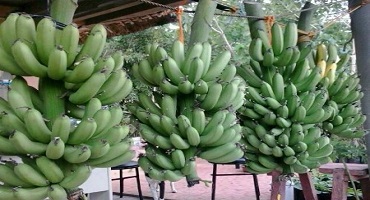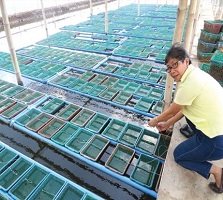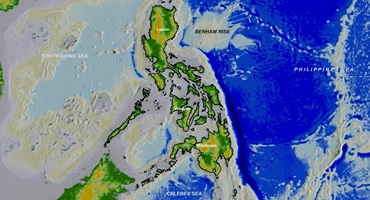 Department of Science and Technology’s Philippine Council for Agriculture, Aquatic and Natural Resources Research and Development (PCAARRD) and the Science and Technology Information Institute (STII), jointly conducted a press conference at Sulo Riviera Hotel, Diliman, Quezon City, on July 3, 2015.
Department of Science and Technology’s Philippine Council for Agriculture, Aquatic and Natural Resources Research and Development (PCAARRD) and the Science and Technology Information Institute (STII), jointly conducted a press conference at Sulo Riviera Hotel, Diliman, Quezon City, on July 3, 2015.
The press conference served as a pre-event for the National Science and Technology Week (NSTW) which will be held on July 24-28 at SMX Convention Center, Pasay City. This year’s NSTW adopts the theme Philippines: A Science Nation Innovating for Global competitiveness.
The press conference focused on Outcome One, the frontrunner of the eight major outcomes of the Department of Science and Technology, and which as pursued by PCAARRD, seeks to provide science-based know how and tools to raise agricultural productivity to world-class standards.
Presented during the press conference were technologies and initiatives, which include the package of technology for production of lakatan, seedstock for soft-shell crab production, protocol for halal goat production, and virus-resistant abaca plant. Research and development initiatives on the Benham Rise exploration and the use of Carrageenan as plant growth promoter for rice were also presented during the press conference.
Dr. Lavernee S. Gueco of the Institute of Plant Breeding (IPB), University of the Philippines Los Baños (UPLB), presented the package of technology (POT) for lakatan production.
Adopting the tagline “No more kundiman for lakatan,” the POT covers site selection to plant establishment, defines the fertilization schedule, as well as cultural management practices that will enable high quantity and good quality of harvest.
Kundiman as a technology promotion strategy, is used to describe the traditional way of planting and harvesting banana in the country which the POT seeks to address (kung di man madiligan, kung di man maalagaan, kung di man malinisian, and kung di man maabonohan).
 With the tagline, Sa alimango kikita tayo, the technology on soft-shell crab farming was presented by Dr. Dolores Estepa of the Southeast Asian Fisheries Development Center (SEAFDEC), Tigbauan, Iloilo City. The technology concerns the development of protocols for the production of hatchery-reared mud crab Scylla serrata juveniles for soft-shell crab farming.
With the tagline, Sa alimango kikita tayo, the technology on soft-shell crab farming was presented by Dr. Dolores Estepa of the Southeast Asian Fisheries Development Center (SEAFDEC), Tigbauan, Iloilo City. The technology concerns the development of protocols for the production of hatchery-reared mud crab Scylla serrata juveniles for soft-shell crab farming.
The project is under the program on Refinement of mud crab nursery technology that seeks to address the problem on the depletion of natural resources of seedstocks that are sourced from the wild.
Dr. Ruby S. Hechanova of the Sultan Kudarat State University presented the protocols on halal goat production. The protocols seek to address the problems of authenticity confronting the country’s halal goat industry. They incorporate essential elements of halal goat production such as religious foundations, cleanliness, hygiene, good health, and good intentions.
 The Benham Rise exploration is a research project initiated to assess the benthic marine biological features and resources of the Benham Bank which is situated at the Benham Rise Region. This region was acquired as a new territory of the Philippines based on the country’s submission for Benham Rise to be considered as an extended continental shelf of the country. The submission was adopted in full by the Commission on the Limits of the Continental Shelf of the United Nations on April 12, 2014.
The Benham Rise exploration is a research project initiated to assess the benthic marine biological features and resources of the Benham Bank which is situated at the Benham Rise Region. This region was acquired as a new territory of the Philippines based on the country’s submission for Benham Rise to be considered as an extended continental shelf of the country. The submission was adopted in full by the Commission on the Limits of the Continental Shelf of the United Nations on April 12, 2014.
The Benham Rise exploration, as presented by Dr. Cesar L. Villanoy of the Marine Science Institute, University of the Philippines Diliman, is a collaboration of UP Mindanao, UP Baguio, Xavier University, and Ateneo de Manila University.
Dr. Antonio G. Lalusin of the Institute of Plant Breeding, College of Agriculture, University of the Philippines Los Baños presented the technology on abaca production.
With the tagline Weaving more opportunities into farmers’ lives, the technology concerns the use of virus-resistant abaca plant that produces good quality abaca pulp and fiber. The species has been developed by cross-breeding an abaca plant with a wild banana variety found in the Bicol region.
Lastly, Dr. Alumanda M. de la Rosa, Director of the Philippine Nuclear Research Institute (PNRI), presented the technology on the use of irradiated carrageenan as plant growth promoter particularly for rice.
“DOST, through PCAARRD, commits to devote its resources to the development of valuable and productive technologies for the interest of our agri-aqua beneficiaries. DOST also commits to bring the fruits of its R&D efforts closer to them using the most feasible approach and strategies,” said DOST Secretary Mario G. Montejo in his message during a media conference held in Manila.
PCAARRD’s effort towards Outcome One is anchored on its implementation of the Industry Strategic S&T Program (ISPs), the Council’s latest R&D-enabling blueprint. The ISPs, as a whole, embodies the different S&T Plans for selected agricultural commodities and crosscutting concerns, describes the targets for each industry and identifies the aspects of the industry where S&T will make a difference.
Through the ISPs, PCAARRD has identified 34 agricultural commodities, through which the country’s agriculture, aquatic, forestry, and natural resources sectors are expected to make a difference.
PCAARRD underscores the importance of its ISPs as it adopts the tagline Strategic Industry S&T Program for Agri-Aqua Growth or SIPAG ni Juan.
